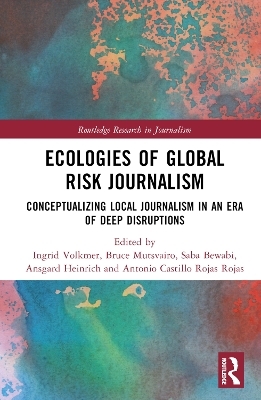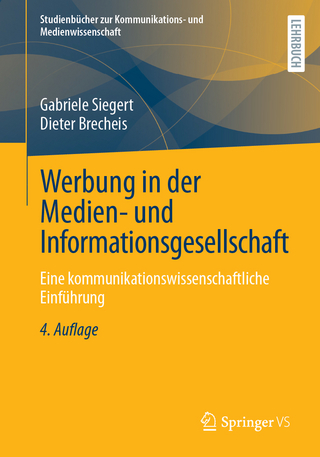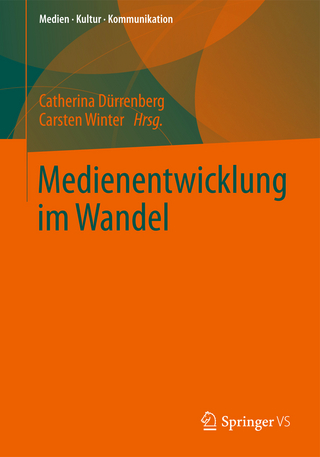
Ecologies of Global Risk Journalism
Routledge (Verlag)
978-1-032-55572-0 (ISBN)
- Lieferbar (Termin unbekannt)
- Versandkostenfrei
- Auch auf Rechnung
- Artikel merken
With chapters written by members of the Global Risk Journalism Hub, an international research network of leading scholars from the Global North and Global South, this collection brings together international journalism researchers from a wide range of theoretical and methodological backgrounds to uncover key issues of ‘global risk journalism’ within their regional contexts. Using the climate crisis and the COVID-19 pandemic as a point of departure, the book explores the effect of digital platforms on news production, how the reporting of these transnational emergencies affects the misinformation ecosystem, the power relations between global and local news sources, and the ethics of conducting research in the face of globalized crises.
This truly international and comparative volume will interest researchers and students of global and local journalism, risk journalism, journalism practice, media and communication studies, intercultural communication, political science and sociology.
Ingrid Volkmer specializes in globalized communication, transnational public communication and digital policy. She has published widely in this area. She led a multi-country study on COVID 19 and Social Media for the World Health Organisation (2020), she collaborates with UNESCO and was involved with the OECD in areas of digital policy debates, specifically in contexts of AI policy. Bruce Mutsvairo is a Professor in the Department of Media and Culture Studies at Utrecht University in the Netherlands. He has authored and edited several books on journalism and media and studies the development of journalism in non-Western societies. Saba Bebawi is Head of the Journalism and Writing discipline in the School of Communication at the University of Technology Sydney (UTS). Bebawi has published on the role of media policy and new technologies in democracy-building and peace-making initiatives, with a focus on journalism in conflict and post-conflict regions. Ansgard Heinrich is Associate Professor of Media and Journalism Studies at the University of Groningen, The Netherlands. She specializes in the study of contemporary journalistic practice and her primary research interests include global conflict reporting, digital disinformation and social media use in journalism. Antonio Castillo is a journalist and academic. He teaches journalism and supervises postgraduate students at RMIT University in Melbourne, Australia. He is the author of “Journalism in the Chilean Transition to Democracy” and co-author of “Cosmopolitan Sydney.” Antonio’s next book, “Up to the Neck in Contradictions,” is a work of journalistic reportage that examines the last decades of Latin American society.
1. Theorizing global risk journalism
2. Planetary risks and emerging dimensions of journalism in transnational interdependence - towards a conception of global ‘risk’ journalism
Section 1: Global risk journalism and local challenges
3. Transformation of journalism practices in Colombia: response to a pandemic risk
4. General trends in Arab Post-COVID-19 journalism: digitalization, practices and job stability
5. Discrediting official sources and technological adaptations – the case of Brazil in a time of a pandemic
6. COVID-19 disinformation & fake news circulation from the perspective of Global South Countries
Section 2: Global risk journalism and the transformation of local practice
7. From disruption to a perfect storm: insights from a holistic analysis of British journalists’ pandemic experiences
8. Implications of the stratification of journalistic work in Mexico - in the context of the global pandemic
9. Who wins the battle between risks and protective factors of journalism? A social-ecological perspective of reporting in Macedonia during the COVID-19 pandemic
10. Making sense of pandemic-induced changes in professional ideology: evidence from Greece and Cyprus.
11. Journalism and risk in Peru: from deadly tolls and economic survival to dangers in news production and framing
12. Managing mental health risks and safety: practical experiences and challenges faced by Global South journalists
Section 3: Global risk journalism: establishing standards and practices in contexts of different types of global crisis
13. The role of journalism in promoting the science-based framing of climate change in the public agenda and the public’s attitudes: Israel as a case study
14. Climate change reporting and narratives: bridging risk disparities with youth and marginalised voices in Tunisia
15. Doing journalism research in times of a contagious global health crisis: methodological dilemmas and reflections from sub-Saharan Africa
16. There are many reasons to fail: journalism standards and climate change reporting in Russia
17. From pity to indifference: analysing affect in visual motifs of animals and climate emergency in Spanish media
18. Climate coverage and its intersections with food security. A content analysis of Mexico’s printed media
19. Climate change journalism in Egypt: roles, challenges and opportunities
| Erscheinungsdatum | 18.12.2024 |
|---|---|
| Reihe/Serie | Routledge Research in Journalism |
| Zusatzinfo | 6 Tables, black and white; 20 Line drawings, black and white; 3 Halftones, black and white; 23 Illustrations, black and white |
| Verlagsort | London |
| Sprache | englisch |
| Maße | 156 x 234 mm |
| Themenwelt | Kunst / Musik / Theater |
| Sozialwissenschaften ► Kommunikation / Medien ► Kommunikationswissenschaft | |
| Sozialwissenschaften ► Kommunikation / Medien ► Medienwissenschaft | |
| ISBN-10 | 1-032-55572-6 / 1032555726 |
| ISBN-13 | 978-1-032-55572-0 / 9781032555720 |
| Zustand | Neuware |
| Informationen gemäß Produktsicherheitsverordnung (GPSR) | |
| Haben Sie eine Frage zum Produkt? |
aus dem Bereich


